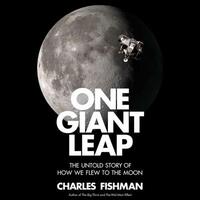Take a photo of a barcode or cover
Anything you've ever wanted to know about the race to the moon and how America achieved this in a decade can be found right here in One Giant Leap: The Impossible Mission That Flew Us to the Moon.
Fishman covers every topic you can possibly think of that's related to the space race, and he does it with flare and finesse.
There are so many great facts packed into this book, I felt like I got a first-rate education on the 60s and the giant effort it took for Americans to put a man on the moon.
The last part of this book covers why it was so important and how humanity benefited from this remarkable achievement. It also outlines the costs of the space program and put things into perspective for me in terms of the political and technological details of America's space program.
Fascinating read. This is a book that sparked interest in a number of other arenas as well. For example, I'm now exploring the USS Nautilus (SSN-571), which was the world's first operational nuclear-powered submarine. It was also the first submarine to navigate 400 meters below the ice under the North Pole on August 3, 1958.
Fishman covers every topic you can possibly think of that's related to the space race, and he does it with flare and finesse.
There are so many great facts packed into this book, I felt like I got a first-rate education on the 60s and the giant effort it took for Americans to put a man on the moon.
The last part of this book covers why it was so important and how humanity benefited from this remarkable achievement. It also outlines the costs of the space program and put things into perspective for me in terms of the political and technological details of America's space program.
Fascinating read. This is a book that sparked interest in a number of other arenas as well. For example, I'm now exploring the USS Nautilus (SSN-571), which was the world's first operational nuclear-powered submarine. It was also the first submarine to navigate 400 meters below the ice under the North Pole on August 3, 1958.
Amazing book that looks at more than just the moon missions. How the jump in technology affected the everyday lives of Americans was extremely interesting.
This is more than a history of the moon landing. It places the feat in context and demonstrates the true value of the mission. Fishman describes Kennedy's motivation for the challenge and how he drove everyone's commitment. Keep members of NASA are also profiled for how the "saved" the mission. The author takes time to discuss the value of the landing beyond the trite items like Tang and Technology. He argues effectively that going to the moon was NOT an either or choice between the moon and poverty programs; rather, it was a matter of giving the country a direction and a common goal. Going to the moon was about leadership.
adventurous
hopeful
informative
inspiring
medium-paced
Well researched, but even better written. Cleverly combines interesting anecdotes and facts about the Apollo space program with big picture perspective on why it all matters.
Reminds you of course what a great story the moonshot is, and there’s a couple of excellent chapters here that focus on some less well known figures and episodes - but overall it’s poorly structured, repetitious and badly edited. The writing can’t bear the weight of the ideas - the final chapter, weighing up if Apollo was a waste of money simply meanders along, and there’s a whole and entirely boring chapter on taking the flag to the moon.
I enjoyed the different angle that this book took, looking at some of the lesser-known stories of the Apollo program. Some of the philosophical discussion didn't entirely convince me, but overall, a great book.
Very good, but VERY dry. It's a historical work, not a beach read. Fishman takes Buzz Aldrin's "one giant leap for mankind" moment and places it in the broader context of the Space Race, the Cold War, the Culture Wars, and demonstrates its tremendous impact on the dawning Information Age. He includes insights gleaned from recently declassified audiotapes that Kennedy had recorded of his conversations in the Oval Office. He depicts the Apollo program not just as a monumental technological challenge but also a project management one, given the number of work-hours that went into every mission.
There's a celebrating-America tone that verges on Jingoistic, although given the context of Americans and Russians trying to outdo each other, it doesn't feel completely inappropriate. A lot of the back half of the book feels like fluff--interesting enough fluff, but not really essential the narrative. And again, the tone is dry so it won't be for everyone. But in terms of learning new and interesting things about the early space program, I found this book fascinating. If it sounds like something you'd probably enjoy, you should definitely check it out.
There's a celebrating-America tone that verges on Jingoistic, although given the context of Americans and Russians trying to outdo each other, it doesn't feel completely inappropriate. A lot of the back half of the book feels like fluff--interesting enough fluff, but not really essential the narrative. And again, the tone is dry so it won't be for everyone. But in terms of learning new and interesting things about the early space program, I found this book fascinating. If it sounds like something you'd probably enjoy, you should definitely check it out.


